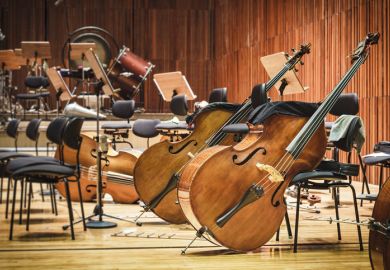Stanley Sadie hails a series that puts composers in their contexts.
These seven books on composers - promised are ones on Mussorgsky, Strauss and Ives - inaugurate a new Cambridge University Press series. The series blurb says they are designed to "provide an account of the life of a major composer, considering both the private and the public figure. The main thread will be biographical, and discussion of the music will be integral to the narrative".
The authors differ considerably as to the amount of actual musical discussion they offer, and no book contains musical examples. There is virtually none in the Beethoven book, which is a disappointment. We hear much about the progress of this young lion, but there is no real indication of the tone in which the lion roared, the ways his music may have differed from that of, say, Haydn or Albrechtsberger. On the other hand, this book gives a better, more rounded picture of the Viennese environment in Beethoven's years there than any other Beethoven biography I know, even some quite extended ones. It neatly defines his place in the city's musical life and is clear and thoroughly sensible on his relationships with his various noble patrons and on the effects of political events on his life. Interestingly, one is left particularly aware of how much Beethoven's ways of thinking remained essentially those of the late 18th century. David Wyn Jones also gives a sharp picture of the Bonn court and of Neefe's special influence on Beethoven in his early days. I was surprised to see no reference to any discontent on Beethoven's part with Haydn as a teacher, or their conflict over the Op.1 trios; Gratz is not identified (it is now Hradec nad Moravic!, near Opava, in the Czech Republic); and the tale of Beethoven's walking out on Prince Karl Lichnowsky's entertainment there, which here is left vague, is usually explained by the presence of French officers, offensive to him, in the audience.
Short music examples might not much have helped illustrate the nature of Beethoven's achievement: but in the Debussy volume, where at several points the nature of the newness of his music could be sharply driven home, they could have served more usefully, to illustrate a chord sequence, a texture or a line - for example, apropos Debussy's letter on L'aprés-midi and Roger Nichols's discussion of it. Nichols writes perceptively about the early years, and of Debussy's relationships with his various teachers and with the Académie des Beaux-Arts, whose comments on Printemps , an envoi from Rome, provide an early musical application of the word "impressionism" - "one of the most dangerous enemies of truth in works of art", they thought - although, as Nichols points out, the work was inspired not by the impressionists but by Botticelli's Primavera. The volume is written with a cool delicacy and precision apt to its subject; it is also a shade knowingly written, as if its readers are half-expected to be familiar with much of what Nichols has to say. It is garnished with many generous and suggestive excerpts from letters, not only Debussy's own but also those of other composers, artists, writers, singers and friends, and is successful in conveying the half-tones of Debussy's music and his personal life, where his ruthless egotism was an ineluctable part of his creative personality.
Peter Bloom's Berlioz volume tells its tale in a manner rather different from the others in the series, showing less concern for the biographical thread. It is almost as if this were a long, thoughtful essay about French music and musical life into which the story of Berlioz is woven. We are told only in passing of the death of Berlioz's first wife, Harriet, and his second marriage, to Marie (of whom, however, there is an informative and sympathetic discussion). Bloom is eager to argue a case for a composer traditionally underrated - or, perhaps more exactly, traditionally regarded as underrated. His book's main strength lies in its lively picture of Parisian artistic life and the significant links between the musical and the political. One part of the usual picture of Berlioz, as neglected and maltreated by the French, fades somewhat, for much of Bloom's narrative shows Berlioz playing an important and esteemed role in Parisian musical life. But sometimes the link between music and politics is misconceived. Biographers are often inclined to wish 20th-century, politically correct attitudes on their subjects. Bloom is guilty of that when he refers to a particular letter as "practically the sole evidence we have of Berlioz's express concern with the obliteration of privilege and the betterment of the poor". The book might have profited from more editorial scrutiny and clarification of its occasional obscure or overloaded sentences; and I cannot imagine why it needed an afterword devoted chiefly to exonerating Berlioz from charges (never made, as far as I know) of partaking in Wagnerian anti-Semitism.
Such issues do, however, arise with Webern, and in her lucidly written book Kathryn Bailey does not shirk them. Webern hardly emerges as a likeable character, arrogant and self-important in his early years, undependable in his dealings with other people and constantly demanding special treatment, intolerant of any but Germanic music, and later strongly inclined towards Hitler and Nazism in spite of his powerful links with Schoenberg. Bailey manages to summarise his contradictions with some sympathy in her final pages. She is possibly too ready to discount the words of one unfavourable witness, Louis Krasner, and I think she misreads one of Webern's comments that he reports - "Even Schoenberg, had he not been a Jew, would have been quite different!", which she takes to be either obvious or ambiguous when it is clearly an offensive comment on supposed Jewish characteristics. Her account of his life manages to include a great deal of detail on the early years. There is little discussion of the music itself, but what there is, such as the passage on Webern's adoption and use of 12-note methods, is lucid and informative. There is no real attempt to relate Webern's personality to his musical style, but some picture does form of how this difficult, self-absorbed, fastidious man came to produce the music he did.
The relation between man and music is more transparent in Peter Franklin's study of Mahler. As a man, Mahler emerges not very much more likeable than Webern, but it is far easier to empathise with him - which is to say that Franklin is particularly successful in conveying the nature of the forces, external as well as internal, that governed his life and made him the person and the composer he was. His upbringing as a Jew in Moravia, his family life with its considerable domestic friction and regular bereavements, his turbulent student years in Vienna, his constant struggles in his various positions to establish the standards he believed in, his battles with Schlamperei and deep-rooted anti-Semitism at the Vienna opera, his fatally flawed marriage and the death of his beloved daughter: in this oppressive and painful world it is hardly surprising that his music so often seems to speak in such agonised tones - and Franklin is deft in his characterisation of Mahler's key works and in relating them to their context. It is easy to understand Mahler's craving for solitude and his need to build "composing huts" in which to get away from it all to work.
John Rosselli's two contributions to the series are distinguished by his cool and unfussy style, his careful handling of sources and his keen understanding of the social environment in which each composer worked. The Bellini volume is outstandingly successful in setting the composer's career within the complex world of Italian opera, in France as well as Italy, of which Rosselli has unrivalled command. He also makes a point of explaining the close relationship between Bellini and the Neapolitan librarian Francesco Florimo, whose 1882 biography - based on a regular correspondence that continued for virtually all of Bellini's life - has seriously muddied the waters because of Florimo's anxiety to project a particular picture of the composer, and is able to quote a number of Florimo versions against the rediscovered originals to illustrate how Bellini's posthumous image has been manipulated. Although the briefest of these volumes, Bellini manages to include a good deal on the composer's personal life as well as his career, along with pertinent critical and descriptive commentary on all of the operas - and in the brief appendix, Rosselli presents new information on three characters who until now have been shadowy figures in the story of Bellini's life.
If Rosselli is less obviously at home in Mozart's world than Bellini's, his Mozart study is certainly a sensible and compact biography, conservative in tone and in its attitudes to the music (he is sceptical of recent claims on behalf of La clemenza di Tito , for example) and dismissive of some of the speculative biographical interpretations of the past few years. On topics as diverse as Mozart's relationship to his father, what happens in Anna's bedroom before the curtain rises on Don Giovanni , and Mozart's religious outlook, Rosselli coolly looks at the evidence in terms of the late 18th century rather than in post-Freudian ones. Yet he is surely incautious to suppose that Mozart was "probably in love" with his 15-year-old pupil Rosa Cannabich (at just the time he was falling in love with Aloysia Weber). Imagery of love and its loss is invoked for the K488 piano concerto, understandably; usually the commentary is quite detached and sober, but Rosselli does occasionally permit himself a telling metaphor. There is some acute reception history in his words on Cosi fan tutte . The book show signs of hasty production - the scanty footnoting, several misprints, poor indexing, the odd wrong date, Köchel number or note-value - and the compressing of so eventful a life and so large an output into so modest a space leads to some cursory treatment of both life and works: but it is an admirable corrective to some of the scattier speculation of recent literature, not to mention Amadeus . If Rosselli does not shed any fresh light on Mozart's place in Viennese musical life, apart from a few wise words on Salieri, that is because it has already been so exhaustively considered in recent years: but it is in the area of context - social, intellectual and musical, to judge by the others in the series - that the Cambridge "Musical Lives" will chiefly have something of their own to offer, something that no other series quite provides.
Stanley Sadie is editor, The New Grove Dictionary of Music and Musicians .
The Life of Beethoven
Author - David Wyn Jones
ISBN - 0 521 56019 5 and 56878 1
Publisher - Cambridge University Press
Price - £.95 and £9.95
Pages - 204
Register to continue
Why register?
- Registration is free and only takes a moment
- Once registered, you can read 3 articles a month
- Sign up for our newsletter
Subscribe
Or subscribe for unlimited access to:
- Unlimited access to news, views, insights & reviews
- Digital editions
- Digital access to THE’s university and college rankings analysis
Already registered or a current subscriber?



